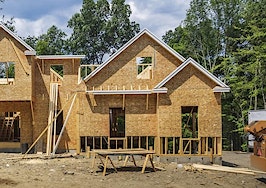Two of the biggest insurance providers for luxury homes in California, American International Group (AIG) and Chubb, will end coverage to thousands of customers in the state due to increased wildfire risk and state regulations, The Wall Street Journal reported Wednesday.
AIG will start notifying some 9,000 customers in its Private Client Group that their home insurance policies won’t be renewed this year as part of a company plan to stop selling policies through a unit regulated by the state’s insurance department and instead offer some policyholders coverage under “excess-and-surplus” policies that are less regulated, according to the paper.
Insurance brokers told WSJ that the latter policies could cost three to five times what AIG’s clients now pay, with less-generous coverage. They said that under current home policies, Californians with homes estimated to cost greater than $10 million to rebuild often pay $20,000 to $40,000 in annual premiums, while those with homes that would cost $30 million or more to rebuild often pay more than $100,000.
Chubb is also non-renewing some policies in the state but accepting new customers “where we have a fair chance of earning an adequate return,” Paul Krump, a Chubb vice chairman, told the paper. Chubb will also offer excess-and-surplus policies to many homeowners whose home insurance policies the company doesn’t renew.
In an October earnings call, Chubb CEO Evan Greenberg said the insurer’s California shrinkage was “not a small amount” in locations “both highly exposed and even moderately exposed to wildfire,” the paper reported. He said “someone else will have the pleasure of writing” business for which “we cannot charge an adequate price for the risk.”
A key point of contention is that California regulators require home insurance companies to set their rates based on historical losses, not projections of future losses, including climate change risks. California is the only state that doesn’t allow insurers to use catastrophic modeling to estimate wildfire losses, according to Politico.
But state regulators say insurers can get adequate rate increases under the current system, and are concerned about catastrophic modeling’s accuracy and fairness to minorities, according to WSJ. In 2020, the state insurance department approved an average 17.5 percent rate increase for AIG’s home policies and AIG has requested another 42 percent increase that’s pending, the publication said. Politico also noted that Insurance Commissioner Ricardo Lara, who is elected, is concerned about increased rates pricing out consumers.
“We are very disappointed that a diversified company with massive global resources like AIG is not staying the course to help support safer, more resilient communities here in California,” Michael Soller, a deputy insurance commissioner, told WSJ.
According to Soller, AIG told state officials that its move is due “not only to heightened wildfire risk exposure in California, but also to the costs of servicing high-value homes” and the impact of global catastrophes on its reinsurance costs.
The risks of climate change to homes and by extension to the financial well-being of the nation are becoming increasingly apparent. At the end of December, the Federal Housing Finance Agency, which regulates Fannie Mae and Freddie Mac, put the mortgage giants on official notice that they’re now expected to factor the financial risks posed by climate change into their decision-making.
The FHFA is a member of the Financial Stability Oversight Council, which was established by Congress in the wake of the 2007-09 mortgage meltdown and recession to identify and address vulnerabilities in the U.S. financial system. In an October report, the council identified climate change “as an emerging and increasing threat to U.S. financial stability.”
The council’s report noted that Fannie and Freddie regularly report loan-level data to FHFA that includes flood risk exposure data at the time of loan origination, including whether the property is located in a Special Flood Hazard Area and whether it’s covered by flood insurance.
A September report funded by the Mortgage Bankers Association warned of the potential for increasingly devastating storms, excessive heat and wildfires, and drought to stretch the National Flood Insurance Program to the breaking point, undermine home prices in vulnerable communities, and drive more homeowners to default on their mortgages.
A previous academic study of property records estimated that homes located in floodplains are overvalued by $43.8 billion because buyers aren’t factoring in the cost of fully insuring them.













